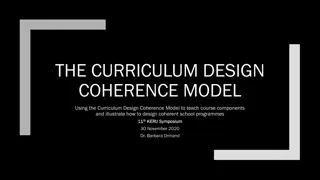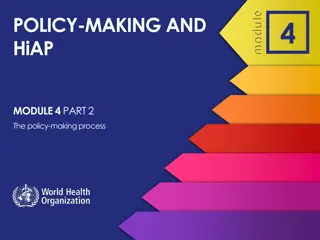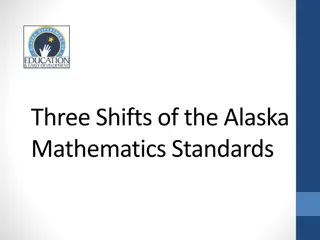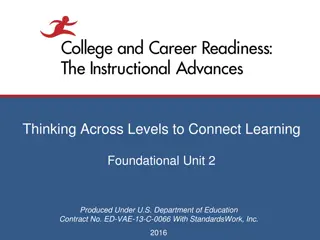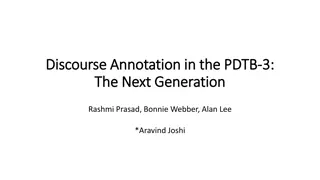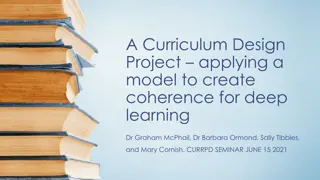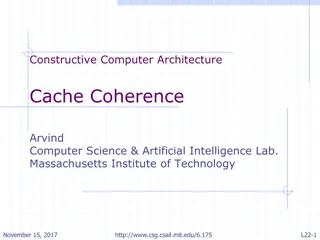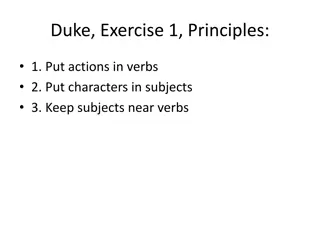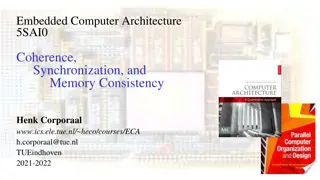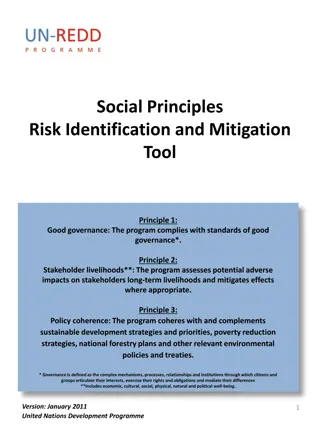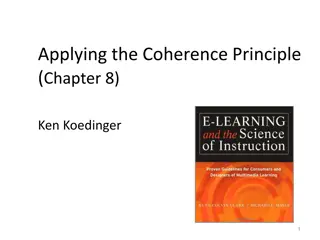Decolonising Approach to Policy Impact: Lessons for Research Culture
Engaging with policy in Global South countries and addressing power imbalances and historical complexities is crucial in policy impact and research culture. The Institute for Policy and Engagement at the University of Nottingham focuses on decolonising policies and research practices to promote equi
0 views • 19 slides
Practical Guide to Writing Policy Briefs for Research Engagement with Policy Makers
Effective communication with policy makers is essential for influencing policy decisions. This practical guide offers advice on creating high-quality policy briefs based on research evidence, providing tools and indicators to measure impact.
0 views • 15 slides
Enhancing Policy Coherence for Sustainable City Development
Supporting policymaker discussions on policy relevance and coherence is crucial for addressing high-level societal needs and demands in cities. This involves analyzing the impacts, synergies, and conflicts of policy instruments, ensuring vertical and horizontal coherence, and identifying knowledge g
5 views • 18 slides
Coherence and Cohesion
Cohesion and coherence play crucial roles in academic writing by ensuring logical flow and connection between ideas. Cohesion involves linking sentences using devices like conjunctions, pronouns, and repetition, while coherence focuses on organizing ideas into paragraphs that logically develop the a
0 views • 13 slides
Understanding Shared Memory Architectures and Cache Coherence
Shared memory architectures involve multiple CPUs sharing one memory with a global address space, with challenges like the cache coherence problem. This summary delves into UMA and NUMA architectures, addressing issues like memory latency and bandwidth, as well as the bus-based UMA and NUMA shared m
0 views • 27 slides
Enhancing Teaching Through Curriculum Design Coherence Model
Explore the use of the Curriculum Design Coherence Model (CDC) for designing effective lectures and guiding pre-service teachers in creating coherent lesson plans. Learn about epistemic progression, systematic ordering of knowledge, types of knowledge, and Bernsteins's knowledge structures to design
0 views • 26 slides
Understanding Policy-Making Process for Health Improvement
Policy-making involves defining policy, recognizing its complex nature, identifying windows of opportunity, and framing health issues. The policy-making cycle includes stages like agenda setting, formulation, and implementation. Alignment of problems, policies, and politics is crucial for effective
1 views • 12 slides
Effective Writing and Policy Briefs: Enhancing Impact in Policy-making
A policy brief is a compelling document designed to influence decision-makers by outlining policy alternatives and courses of action. Discover the value of policy briefs, effective characteristics, and strategies for agenda setting and policy formulation in this comprehensive module.
1 views • 22 slides
Understanding Theories of the Policy Cycle in Policy Analysis
The policy cycle theory describes the evolution of policy issues from inception to evaluation, impacting scientific research and policy formulation. It outlines stages from the 1950s, influenced by Lasswell's seven-stage model, serving as a framework for organizing policy processes. Despite the line
3 views • 30 slides
Understanding Shared Memory Architectures and Cache Coherence
Shared memory architectures involve multiple CPUs accessing a common memory, leading to challenges like the cache coherence problem. This article delves into different types of shared memory architectures, such as UMA and NUMA, and explores the cache coherence issue and protocols. It also highlights
2 views • 27 slides
Promoting Gender Equality and Fighting Corruption in Africa: AU Policy Coherence
Addressing the intertwining issues of corruption and gender inequality in Africa is crucial for sustainable development. This session will explore the complexities of corruption, engaging stakeholders, and the role of policy coherence in advancing women's empowerment. Key areas of focus include inst
0 views • 17 slides
Enhancing Coherence in Graduate Writing
Writing with coherence is essential for effective communication in graduate-level writing. Coherence, also known as flow, helps connect ideas logically within a sentence and paragraph. By structuring sentences to present old information before new information, writers can improve readability and cla
0 views • 39 slides
An Examination of Ontological Arguments for God's Necessary Existence
Various ontological arguments, such as Malcolm's and Anselm's, propose that the existence of God is logically necessary, grounded in the concept of God as the greatest possible being. These arguments challenge the coherence of the concept of God and counter objections, like Kant's claim that existen
2 views • 10 slides
Challenges in Policy Implementation and Lessons Learned
The content discusses the challenges faced in policy implementation, focusing on the gap between policy design and execution. It highlights key steps in policy-making, reasons for implementation failures, and factors influencing successful policy outcomes. Examples from Zambia's National Science and
0 views • 14 slides
Three Shifts of Alaska Mathematics Standards Overview
This content discusses the three key shifts in the Alaska Mathematics Standards, emphasizing focus, coherence, and rigor in mathematics education. It highlights the importance of deeply engaging with key topics, connecting concepts across grades, and promoting fluency in arithmetic and real-world ap
0 views • 19 slides
Unlocking Africa's Industrial Potential through Urban Demand
Addressing the interplay between urban demand and domestic industry is crucial for Africa's industrial development. Prof. Fiona Tregenna emphasizes the significance of industrialization, structural change, and policy coherence to foster a virtuous circle between industrialization, urbanization, and
0 views • 14 slides
Coherence in Standards and Curricula: Connecting Learning Levels
Explore the importance of coherence in standards and curricula, focusing on three key advances prompted by the CCR standards. Understand why coherence is vital for college and career readiness, and discover how it impacts instruction and learning progression. Engage in hands-on practices to work wit
0 views • 11 slides
Understanding Discourse Coherence and Annotation in PDTB
NLP research on discourse coherence explores relations between events and propositions expressed in text, with a focus on combining individual relations into complex coherence structures. The PDTB approach annotates low-level relations in corpora to derive emergent high-level structural representati
0 views • 40 slides
Evaluation of PNIN Phase I: Preliminary Results and Research Questions
This article discusses the evaluation of Phase I of the PNIN project, focusing on relevance, coherence, efficacy, impact, and sustainability. It explores the approach, methodology, research questions, and revised Theory of Change. The study aims to assess the performance of PNIN, potential changes n
0 views • 17 slides
Enhancing Curriculum Coherence for Deep Learning: A Model-driven Approach
Addressing the disconnect between conceptual knowledge and applied competencies in education, the Curriculum Design Coherence Model offers a structured framework to create coherence for deep learning. Developed in response to educational challenges such as skills versus knowledge imbalance and fragm
1 views • 28 slides
Enhancing Accelerator-Host Coherence with Crossing Guard
Explore the need for coherence interfaces in integrating accelerators with host protocols, addressing complexities and safety concerns, emphasizing customizable caches and standardized interfaces for optimal performance and system reliability.
0 views • 55 slides
Efficient Coherence Tracking in Many-core Systems Using Sparse Directories
This research focuses on utilizing tiny, sparse directories for efficient coherence tracking in many-core systems. By optimizing directory entries and leveraging sharing patterns, the proposed approach achieves high performance with minimal on-chip area investment. Results demonstrate significant en
0 views • 66 slides
Master the Art of Writing: Composition and Coherence
Enhance your writing skills by understanding the principles of composition and coherence. Learn how to structure your writing effectively, from captivating introductions to cohesive conclusions. Dive into the world of petting cats with expert tips on building a strong bond with your feline friend. D
0 views • 7 slides
Theories and Strategies for Effective Policy Change
Explore the intricacies of strategic planning, outcome mapping, change theories, policy windows, and more in the realm of policy entrepreneurship and advocacy. Learn about key concepts such as large leaps theory, policy streams theory, and how think tanks can influence policy decision-making process
0 views • 43 slides
Efficient Manager-Client Pairing for Coherence Hierarchies
Addressing the challenges in designing and integrating coherence protocols, this framework emphasizes using existing protocols as building blocks for heterogeneous hierarchies. The Manager-Client Pairing approach enables efficient communication, action types, and usage of tier width and hierarchy he
0 views • 18 slides
Morality in UK Drug Policy: Policy Constellations Analysis
Morality plays a significant role in shaping drug policy in the UK, as revealed by the research conducted by Professor Alex Stevens at the University of Kent. The study investigates the moral commitments underlying different policy positions in UK drug policy debates, highlighting five ethico-politi
0 views • 19 slides
International Water Policy Cooperation Project Overview
This project involves various consortia members, partners, and stakeholders from Europe and China collaborating to address water policy challenges. The work includes strategic coordination, business innovation, and policy alignment to improve water resource efficiency and digitalization. Key objecti
0 views • 8 slides
Industrial Policy: The Old and The New - Insights by Dani Rodrik
Industrial policy, as presented by Dani Rodrik in May 2019, emphasizes the importance of empirical work, the differences between old and new policies, and the targets industrial policy should focus on. The theoretical arguments for industrial policy highlight market imperfections, learning spillover
0 views • 26 slides
Policy Coherence for Just Transition Pathways in UAE Work Programme
This dialogue focused on mainstreaming just transition pathways in NDCs/NAPs/LT-LEDS, incorporating a whole-of-government approach, ensuring coherence with national development priorities and international commitments. Key points included inclusive policy frameworks, stakeholder engagement, economic
0 views • 6 slides
Understanding Cache Coherence in Computer Architecture
Exploring the concept of cache coherence in computer architecture, this content delves into the challenges and solutions associated with maintaining consistency among multiple caches in modern systems. It discusses the importance of coherence in shared memory systems and the use of cache-coherent me
0 views • 24 slides
Duke Writing Principles and Techniques
Duke provides essential writing principles and techniques to enhance clarity and coherence in your writing. Principles include putting actions in verbs, characters in subjects, and keeping subjects near verbs. Additionally, it emphasizes cohesion, coherence, and emphasis through strategies like putt
0 views • 22 slides
Revisiting Complexity of Hardware Cache Coherence in Computer Science
Today's shared memory systems face increasing complexity in cache coherence protocol implementations, posing significant challenges in verification and optimization. This study re-evaluates the complexities of existing protocols like MESI and introduces an alternative approach called DeNovo, focusin
0 views • 18 slides
Understanding Shared Memory Coherence, Synchronization, and Consistency in Embedded Computer Architecture
This content delves into the complexities of shared memory architecture in embedded computer systems, addressing key issues such as coherence, synchronization, and memory consistency. It explains how cache coherence ensures the most recent data is accessed by all processors, and discusses methods li
0 views • 47 slides
Understanding Shared Memory Architecture in Embedded Computer Systems
Explore the fundamental concepts of coherence, synchronization, and memory consistency in embedded computer architecture. Learn how shared memory multiprocessors handle issues like cache coherence, and discover the importance of enforcing coherence with protocols like snooping and directory-based ap
0 views • 53 slides
Understanding Discourse Analysis and Its Components
Discourse analysis focuses on linguistic units beyond single utterances, exploring the structure and coherence of spoken or written language. This analysis delves into defining discourse, providing examples, and discussing the criteria for qualifying a text as discourse. Through cohesion, coherence,
0 views • 15 slides
Optimizing Coherence Mechanisms for Near-Data Accelerators
Coherence mechanisms play a crucial role in supporting efficient communication between Near-Data Accelerators (NDAs) and CPUs. The CoNDA framework introduces an optimistic approach to coherence, aiming to reduce unnecessary off-chip data movement and enhance performance. By gaining insights before c
0 views • 55 slides
Understanding Policy Formulation: Key Concepts and Approaches
Policy formulation is a crucial step in the policy-making process, involving identifying and crafting policy alternatives to address various issues. This phase requires participants to define policy problems, develop alternatives, and select the most feasible solutions based on criteria such as feas
0 views • 12 slides
Understanding Discourse Analysis: Cohesion, Coherence, and More
Discourse analysis delves into written and spoken communications across various contexts. It encompasses cohesion, which includes grammatical and lexical links within text for creating meaning, and coherence, which ensures semantic meaningfulness. Explore how DA identifies and analyzes language use
1 views • 29 slides
Social Principles Risk Identification and Mitigation Tool Overview
This document outlines the principles and minimum social standards for risk identification and mitigation in programs, focusing on good governance, stakeholder livelihoods, and policy coherence. It provides criteria for assessing risks, including policy risks and actions for mitigation at different
0 views • 15 slides
Enhancing Student Learning Through Coherence Principle
The Coherence Principle emphasizes the importance of excluding extraneous, entertaining materials to improve student learning. Including such materials can compete for cognitive resources and divert attention from essential information. Utilizing simpler visuals and avoiding websites that violate th
0 views • 7 slides





